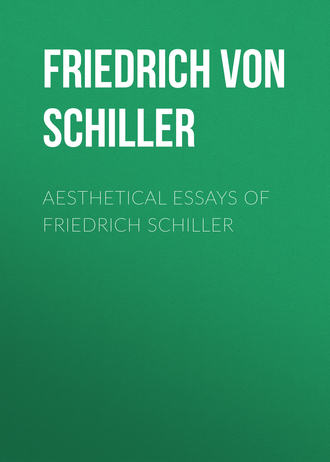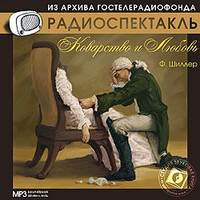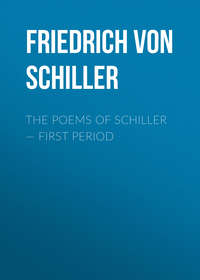 полная версия
полная версияAesthetical Essays of Friedrich Schiller
Thus the sublime opens to us a road to overstep the limits of the world of sense, in which the feeling of the beautiful would forever imprison us. It is not little by little (for between absolute dependence and absolute liberty there is no possible transition), it is suddenly and by a shock that the sublime wrenches our spiritual and independent nature away from the net which feeling has spun round us, and which enchains the soul the more tightly because of its subtle texture. Whatever may be the extent to which feeling has gained a mastery over men by the latent influence of a softening taste, when even it should have succeeded in penetrating into the most secret recesses of moral jurisdiction under the deceptive envelope of spiritual beauty, and there poisoning the holiness of principle at its source – one single sublime emotion often suffices to break all this tissue of imposture, at one blow to give freedom to the fettered elasticity of spiritual nature, to reveal its true destination, and to oblige it to conceive, for one instant at least, the feeling of its liberty. Beauty, under the shape of the divine Calypso, bewitched the virtuous son of Ulysses, and the power of her charms held him long a prisoner in her island. For long he believed he was obeying an immortal divinity, whilst he was only the slave of sense; but suddenly an impression of the sublime in the form of Mentor seizes him; he remembers that he is called to a higher destiny – he throws himself into the waves, and is free.
The sublime, like the beautiful, is spread profusely throughout nature, and the faculty to feel both one and the other has been given to all men; but the germ does not develop equally; it is necessary that art should lend its aid. The aim of nature supposes already that we ought spontaneously to advance towards the beautiful, although we still avoid the sublime: for the beautiful is like the nurse of our childhood, and it is for her to refine our soul in withdrawing it from the rude state of nature. But though she is our first affection, and our faculty of feeling is first developed for her, nature has so provided, nevertheless, that this faculty ripens slowly and awaits its full development until the understanding and the heart are formed. If taste attains its full maturity before truth and morality have been established in our heart by a better road than that which taste would take, the sensuous world would remain the limit of our aspirations. We should not know, either in our ideas or in our feelings, how to pass beyond the world of sense, and all that imagination failed to represent would be without reality to us. But happily it enters into the plan of nature, that taste, although it first comes into bloom, is the last to ripen of all the faculties of the mind. During this interval, man has time to store up in his mind a provision of ideas, a treasure of principles in his heart, and then to develop especially, in drawing from reason, his feeling for the great and the sublime.
As long as man was only the slave of physical necessity, while he had found no issue to escape from the narrow circle of his appetites, and while he as yet felt none of that superior liberty which connects him with the angels, nature, so far as she is incomprehensible, could not fail to impress him with the insufficiency of his imagination, and again, as far as she is a destructive force, to recall his physical powerlessness. He is forced then to pass timidly towards one, and to turn away with affright from the other. But scarcely has free contemplation assured him against the blind oppression of the forces of nature – scarcely has he recognized amidst the tide of phenomena something permanent in his own being – than at once the coarse agglomeration of nature that surrounds him begins to speak in another language to his heart, and the relative grandeur which is without becomes for him a mirror in which he contemplates the absolute greatness which is within himself. He approaches without fear, and with a thrill of pleasure, those pictures which terrified his imagination, and intentionally makes an appeal to the whole strength of that faculty by which we represent the infinite perceived by the senses, in order if she fails in this attempt, to feel all the more vividly how much these ideas are superior to all that the highest sensuous faculty can give. The sight of a distant infinity – of heights beyond vision, this vast ocean which is at his feet, that other ocean still more vast which stretches above his head, transport and ravish his mind beyond the narrow circle of the real, beyond this narrow and oppressive prison of physical life. The simple majesty of nature offers him a less circumscribed measure for estimating its grandeur, and, surrounded by the grand outlines which it presents to him, he can no longer bear anything mean in his way of thinking. Who can tell how many luminous ideas, how many heroic resolutions, which would never have been conceived in the dark study of the imprisoned man of science, nor in the saloons where the people of society elbow each other, have been inspired on a sudden during a walk, only by the contact and the generous struggle of the soul with the great spirit of nature? Who knows if it is not owing to a less frequent intercourse with this sublime spirit that we must partially attribute the narrowness of mind so common to the dwellers in towns, always bent under the minutiae which dwarf and wither their soul, whilst the soul of the nomad remains open and free as the firmament beneath which he pitches his tent?
But it is not only the unimaginable or the sublime in quantity, it is also the incomprehensible, that which escapes the understanding and that which troubles it, which can serve to give us an idea of the super-sensuous infinity. As soon as this element attains the grandiose and announces itself to us as the work of nature (for otherwise it is only despicable), it then aids the soul to represent to itself the ideal, and imprints upon it a noble development. Who does not love the eloquent disorder of natural scenery to the insipid regularity of a French garden? Who does not admire in the plains of Sicily the marvellous combat of nature with herself – of her creative force and her destructive power? Who does not prefer to feast his eyes upon the wild streams and waterfalls of Scotland, upon its misty mountains, upon that romantic nature from which Ossian drew his inspiration – rather than to grow enthusiastic in this stiff Holland, before the laborious triumph of patience over the most stubborn of elements? No one will deny that in the rich grazing-grounds of Holland, things are not better ordered for the wants of physical man than upon the perfid crater of Vesuvius, and that the understanding which likes to comprehend and arrange all things, does not find its requirements rather in the regularly planted farm-garden than in the uncultivated beauty of natural scenery. But man has requirements which go beyond those of natural life and comfort or well-being; he has another destiny than merely to comprehend the phenomena which surround him.
In the same manner as for the observant traveller, the strange wildness of nature is so attractive in physical nature – thus, and for the same reason, every soul capable of enthusiasm finds even in the regrettable anarchy found in the moral world a source of singular pleasure. Without doubt he who sees the grand economy of nature only from the impoverished light of the understanding; he who has never any other thought than to reform its defiant disorder and to substitute harmony, such a one could not find pleasure in a world which seems given up to the caprice of chance rather than governed according to a wise ordination, and where merit and fortune are for the most part in opposition. He desires that the whole world throughout its vast space should be ruled like a house well regulated; and when this much-desired regularity is not found, he has no other resource than to defer to a future life, and to another and better nature, the satisfaction which is his due, but which neither the present nor the past afford him. On the contrary, he renounces willingly the pretension of restoring this chaos of phenomena to one single notion; he regains on another side, and with interest, what he loses on this side. Just this want of connection, this anarchy, in the phenomena, making them useless to the understanding, is what makes them valuable to reason. The more they are disorderly the more they represent the freedom of nature. In a sense, if you suppress all connection, you have independence. Thus, under the idea of liberty, reason brings back to unity of thought that which the understanding could not bring to unity of notion. It thus shows its superiority over the understanding, as a faculty subject to the conditions of a sensuous order. When we consider of what value it is to a rational being to be independent of natural laws, we see how much man finds in the liberty of sublime objects as a set-off against the checks of his cognitive faculty. Liberty, with all its drawbacks, is everywhere vastly more attractive to a noble soul than good social order without it – than society like a flock of sheep, or a machine working like a watch. This mechanism makes of man only a product; liberty makes him the citizen of a better world.
It is only thus viewed that history is sublime to me. The world, as a historic object, is only the strife of natural forces; with one another and with man's freedom. History registers more actions referable to nature than to free will; it is only in a few cases, like Cato and Phocion, that reason has made its power felt. If we expect a treasury of knowledge in history how we are deceived! All attempts of philosophy to reconcile what the moral world demands with what the real world gives is belied by experience, and nature seems as illogical in history as she is logical in the organic kingdoms.
But if we give up explanation it is different. Nature, in being capricious and defying logic, in pulling down great and little, in crushing the noblest works of man, taking centuries to form – nature, by deviating from intellectual laws, proves that you cannot explain nature by nature's laws themselves, and this sight drives the mind to the world of ideas, to the absolute.
But though nature as a sensuous activity drives us to the ideal, it throws us still more into the world of ideas by the terrible. Our highest aspiration is to be in good relations with physical nature, without violating morality. But it is not always convenient to serve two masters; and though duty and the appetites should never be at strife, physical necessity is peremptory, and nothing can save men from evil destiny. Happy is he who learns to bear what he cannot change! There are cases where fate overpowers all ramparts, and where the only resistance is, like a pure spirit, to throw freely off all interest of sense, and strip yourself of your body. Now this force comes from sublime emotions, and a frequent commerce with destructive nature. Pathos is a sort of artificial misfortune, and brings us to the spiritual law that commands our soul. Real misfortune does not always choose its time opportunely, while pathos finds us armed at all points. By frequently renewing this exercise of its own activity the mind controls the sensuous, so that when real misfortune comes, it can treat it as an artificial suffering, and make it a sublime emotion. Thus pathos takes away some of the malignity of destiny, and wards off its blows.
Away then with that false theory which supposes falsely a harmony binding well being and well doing. Let evil destiny show its face. Our safety is not in blindness, but in facing our dangers. What can do so better than familiarity with the splendid and terrible evolution of events, or than pictures showing man in conflict with chance; evil triumphant, security deceived – pictures shown us throughout history, and placed before us by tragedy? Whoever passes in review the terrible fate of Mithridates, of Syracuse, and Carthage, cannot help keeping his appetite in check, at least for a time, and, seeing the vanity of things, strive after that which is permanent. The capacity of the sublime is one of the noblest aptitudes of man. Beauty is useful, but does not go beyond man. The sublime applies to the pure spirit. The sublime must be joined to the beautiful to complete the aesthetic education, and to enlarge man's heart beyond the sensuous world.
Without the beautiful there would be an eternal strife between our natural and rational destiny. If we only thought of our vocation as spirits we should be strangers to this sphere of life. Without the sublime, beauty would make us forget our dignity. Enervated – wedded to this transient state, we should lose sight of our true country. We are only perfect citizens of nature when the sublime is wedded to the beautiful.
Many things in nature offer man the beautiful and sublime. But here again he is better served at second-hand. He prefers to have them ready-made in art rather than seek them painfully in nature. This instinct for imitation in art has the advantage of being able to make those points essential that nature has made secondary. While nature suffers violence in the organic world, or exercises violence, working with power upon man, though she can only be aesthetical as an object of pure contemplation, art, plastic art, is fully free, because it throws off all accidental restrictions and leaves the mind free, because it imitates the appearance, not the reality of objects. As all sublimity and beauty consists in the appearance, and not in the value of the object, it follows that art has all the advantages of nature without her shackles.
THE PATHETIC
The depicting of suffering, in the shape of simple suffering, is never the end of art, but it is of the greatest importance as a means of attaining its end. The highest aim of art is to represent the super-sensuous, and this is effected in particular by tragic art, because it represents by sensible marks the moral man, maintaining himself in a state of passion, independently of the laws of nature. The principle of freedom in man becomes conscious of itself only by the resistance it offers to the violence of the feelings. Now the resistance can only be measured by the strength of the attack. In order, therefore, that the intelligence may reveal itself in man as a force independent of nature, it is necessary that nature should have first displayed all her power before our eyes. The sensuous being must be profoundly and strongly affected, passion must be in play, that the reasonable being may be able to testify his independence and manifest himself in action.
It is impossible to know if the empire which man has over his affections is the effect of a moral force, till we have acquired the certainty that it is not an effect of insensibility. There is no merit in mastering the feelings which only lightly and transitorily skim over the surface of the soul. But to resist a tempest which stirs up the whole of sensuous nature, and to preserve in it the freedom of the soul, a faculty of resistance is required infinitely superior to the act of natural force. Accordingly it will not be possible to represent moral freedom, except by expressing passion, or suffering nature, with the greatest vividness; and the hero of tragedy must first have justified his claim to be a sensuous being before aspiring to our homage as a reasonable being, and making us believe in his strength of mind.
Therefore the pathetic is the first condition required most strictly in a tragic author, and he is allowed to carry his description of suffering as far as possible, without prejudice to the highest end of his art, that is, without moral freedom being oppressed by it. He must give in some sort to his hero, as to his reader, their full load of suffering, without which the question will always be put whether the resistance opposed to suffering is an act of the soul, something positive, or whether it is not rather a purely negative thing, a simple deficiency.
The latter case is offered in the purer French tragedy, where it is very rare, or perhaps unexampled, for the author to place before the reader suffering nature, and where generally, on the contrary, it is only the poet who warms up and declaims, or the comedian who struts about on stilts. The icy tone of declamation extinguishes all nature here, and the French tragedians, with their superstitious worship of decorum, make it quite impossible for them to paint human nature truly. Decorum, wherever it is, even in its proper place, always falsifies the expression of nature, and yet this expression is rigorously required by art. In a French tragedy, it is difficult for us to believe that the hero ever suffers, for he explains the state of his soul, as the coolest man would do, and always thinking of the effect he is making on others, he never lets nature pour forth freely. The kings, the princesses, and the heroes of Corneille or Voltaire never forget their rank even in the most violent excess of passion; and they part with their humanity much sooner than with their dignity. They are like those kings and emperors of our old picture-books, who go to bed with their crowns on.
What a difference from the Greeks and those of the moderns who have been inspired with their spirit in poetry! Never does the Greek poet blush at nature; he leaves to the sensuous all its rights, and yet he is quite certain never to be subdued by it. He has too much depth and too much rectitude in his mind not to distinguish the accidental, which is the principal point with false taste, from the really necessary; but all that is not humanity itself is accidental in man. The Greek artist who has to represent a Laocoon, a Niobe, and a Philoctetes, does not care for the king, the princess, or the king's son; he keeps to the man. Accordingly the skilful statuary sets aside the drapery, and shows us nude figures, though he knows quite well it is not so in real life. This is because drapery is to him an accidental thing, and because the necessary ought never to be sacrificed to the accidental. It is also because, if decency and physical necessities have their laws, these laws are not those of art. The statuary ought to show us, and wishes to show us, the man himself; drapery conceals him, therefore he sets that aside, and with reason.
The Greek sculptor rejects drapery as a useless and embarrassing load, to make way for human nature; and in like manner the Greek poet emancipates the human personages he brings forward from the equally useless constraint of decorum, and all those icy laws of propriety, which put nothing but what is artificial in man, and conceal nature in it. Take Homer and the tragedians; suffering nature speaks the language of truth and ingenuousness in their pages, and in a way to penetrate to the depths of our hearts. All the passions play their part freely, nor do the rules of propriety compress any feeling with the Greeks. The heroes are just as much under the influence of suffering as other men, and what makes them heroes is the very fact that they feel suffering strongly and deeply, without suffering overcoming them. They love life as ardently as others; but they are not so ruled by this feeling as to be unable to give up life when the duties of honor or humanity call on them to do so. Philoctetes filled the Greek stage with his lamentations; Hercules himself, when in fury, does not keep under his grief. Iphigenia, on the point of being sacrificed, confesses with a touching ingenuousness that she grieves to part with the light of the sun. Never does the Greek place his glory in being insensible or indifferent to suffering, but rather in supporting it, though feeling it in its fulness. The very gods of the Greeks must pay their tribute to nature, when the poet wishes to make them approximate to humanity. Mars, when wounded, roars like ten thousand men together, and Venus, scratched by an iron lance, mounts again to Olympus, weeping, and cursing all battles.
This lively susceptibility on the score of suffering, this warm, ingenuous nature, showing itself uncovered and in all truth in the monuments of Greek art, and filling us with such deep and lively emotions – this is a model presented for the imitation of all artists; it is a law which Greek genius has laid down for the fine arts. It is always and eternally nature which has the first rights over man; she ought never to be fettered, because man, before being anything else, is a sensuous creature. After the rights of nature come those of reason, because man is a rational, sensuous being, a moral person, and because it is a duty for this person not to let himself be ruled by nature, but to rule her. It is only after satisfaction has been given in the first place to nature, and after reason in the second place has made its rights acknowledged, that it is permitted for decorum in the third place to make good its claims, to impose on man, in the expression of his moral feelings and of his sensations, considerations towards society, and to show in it the social being, the civilized man. The first law of the tragic art was to represent suffering nature. The second law is to represent the resistance of morality opposed to suffering.
Affection, as affection, is an unimportant thing; and the portraiture of affection, considered in itself, would be without any aesthetic value; for, I repeat it, nothing that only interests sensuous nature is worthy of being represented by art. Thus not only the affections that do nothing but enervate and soften man, but in general all affections, even those that are exalted, ecstatic, whatever may be their nature, are beneath the dignity of tragic art.
The soft emotions, only producing tenderness, are of the nature of the agreeable, with which the fine arts are not concerned. They only caress the senses, while relaxing and creating languidness, and only relate to external nature, not at all to the inner nature of man. A good number of our romances and of our tragedies, particularly those that bear the name of dramas – a sort of compromise between tragedy and comedy – a good number also of those highly-appreciated family portraits, belong to this class. The only effect of these works is to empty the lachrymal duct, and soothe the overflowing feelings; but the mind comes back from them empty, and the moral being, the noblest part of our nature, gathers no new strength whatever from them. "It is thus," says Kant, "that many persons feel themselves edified by a sermon that has nothing edifying in it." It seems also that modern music only aims at interesting the sensuous, and in this it flatters the taste of the day, which seeks to be agreeably tickled, but not to be startled, nor strongly moved and elevated. Accordingly we see music prefer all that is tender; and whatever be the noise in a concert-room, silence is immediately restored, and every one is all ears directly a sentimental passage is performed. Then an expression of sensibility common to animalism shows itself commonly on all faces; the eyes are swimming with intoxication, the open mouth is all desire, a voluptuous trembling takes hold of the entire body, the breath is quick and full, in short, all the symptoms of intoxication appear. This is an evident proof that the senses swim in delight, but that the mind or the principle of freedom in man has become a prey to the violence of the sensuous impression. Real taste, that of noble and manly minds, rejects all these emotions as unworthy of art, because they only please the senses, with which art has nothing in common.
But, on the other hand, real taste excludes all extreme affections, which only put sensuousness to the torture, without giving the mind any compensation. These affections oppress moral liberty by pain, as the others by voluptuousness; consequently they can excite aversion, and not the emotion that would alone be worthy of art. Art ought to charm the mind and give satisfaction to the feeling of moral freedom. This man who is a prey to his pain is to me simply a tortured animate being, and not a man tried by suffering. For a moral resistance to painful affections is already required of man – a resistance which can alone allow the principle of moral freedom, the intelligence, to make itself known in it.
If it is so, the poets and the artists are poor adepts in their art when they seek to reach the pathetic only by the sensuous force of affection and by representing suffering in the most vivid manner. They forget that suffering in itself can never be the last end of imitation, nor the immediate source of the pleasure we experience in tragedy. The pathetic only has aesthetic value in as far as it is sublime. Now, effects that only allow us to infer a purely sensuous cause, and that are founded only on the affection experienced by the faculty of sense, are never sublime, whatever energy they may display, for everything sublime proceeds exclusively from the reason.









